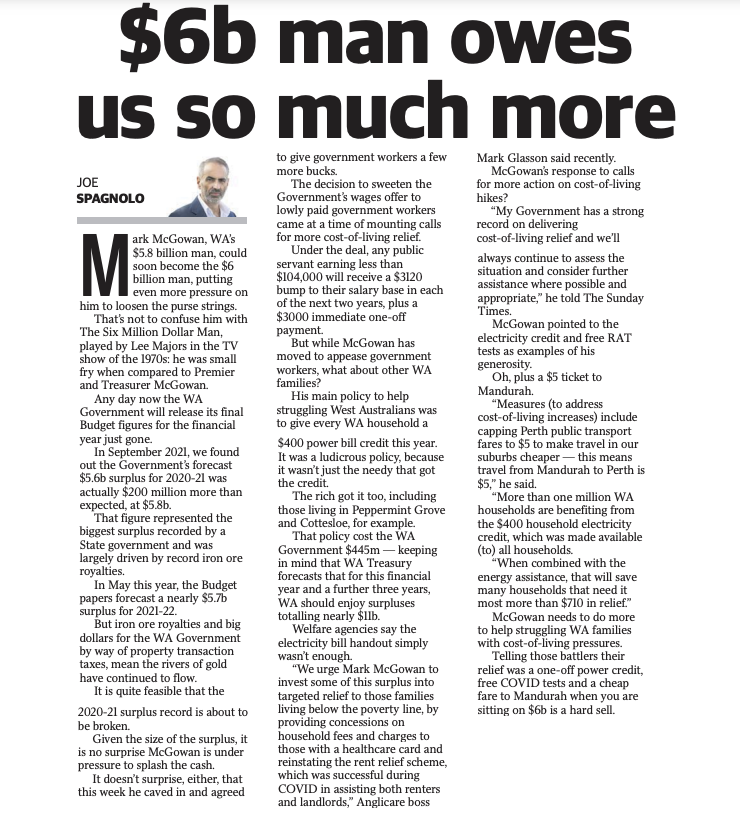
Article by Joe Spagnolo courtesy of the Sunday Times.
Mark McGowan, WA’s $5.8 billion man, could soon become the $6 billion man, putting Meven more pressure on him to loosen the purse strings.
That’s not to confuse him with The Six Million Dollar Man, played by Lee Majors in the TV show of the 1970s: he was small fry when compared to Premier and Treasurer McGowan.
Any day now the WA Government will release its final Budget figures for the financial year just gone.
In September 2021, we found out the Government’s forecast $5.6b surplus for 2020-21 was actually $200 million more than expected, at $5.8b.
That figure represented the biggest surplus recorded by a State government and was largely driven by record iron ore royalties.
In May this year, the Budget papers forecast a nearly $5.7b surplus for 2021-22.
But iron ore royalties and big dollars for the WA Government by way of property transaction taxes, mean the rivers of gold have continued to flow.
It is quite feasible that the 2020-21 surplus record is about to be broken.
Given the size of the surplus, it is no surprise McGowan is under pressure to splash the cash.
It doesn’t surprise, either, that this week he caved in and agreed to give government workers a few more bucks.
The decision to sweeten the Government’s wages offer to lowly paid government workers came at a time of mounting calls for more cost-of-living relief.
Under the deal, any public servant earning less than $104,000 will receive a $3120 bump to their salary base in each of the next two years, plus a $3000 immediate one-off payment.
But while McGowan has moved to appease government workers, what about other WA families?
His main policy to help struggling West Australians was to give every WA household a $400 power bill credit this year.
It was a ludicrous policy, because it wasn’t just the needy that got the credit.
The rich got it too, including those living in Peppermint Grove and Cottesloe, for example.
That policy cost the WA Government $445m keeping in mind that WA Treasury forecasts that for this financial year and a further three years, WA should enjoy surpluses totalling nearly $11b.
Welfare agencies say the electricity bill handout simply wasn’t enough.
“We urge Mark McGowan to invest some of this surplus into targeted relief to those families living below the poverty line, by providing concessions on household fees and charges to those with a healthcare card and reinstating the rent relief scheme, which was successful during COVID in assisting both renters and landlords,” Anglicare boss Mark Glasson said recently.
McGowan’s response to calls for more action on cost-of-living hikes?
“My Government has a strong record on delivering cost-of-living relief and we’ll always continue to assess the situation and consider further assistance where possible and appropriate,” he told The Sunday Times.
McGowan pointed to the electricity credit and free RAT tests as examples of his generosity.
Oh, plus a $5 ticket to Mandurah.
“Measures (to address cost-of-living increases) include capping Perth public transport fares to $5 to make travel in our suburbs cheaper this means travel from Mandurah to Perth is $5,” he said.
“More than one million WA households are benefiting from the $400 household electricity credit, which was made available (to) all households.
“When combined with the energy assistance, that will save many households that need it most more than $710 in relief.” McGowan needs to do more to help struggling WA families with cost-of-living pressures.
Telling those battlers their relief was a one-off power credit, free COVID tests and a cheap fare to Mandurah when you are sitting on $6b is a hard sell.
